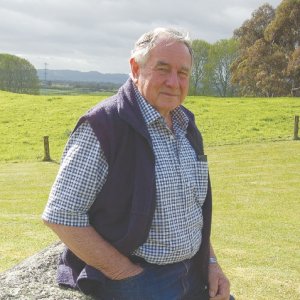On the verge of retirement, the former industry leader remains convinced TAF (trading among farmers) is a smokescreen for eventual listing of Fonterra. Bull, 75, is leaving the industry after a 50-year stint, 20 of them devoted to governance roles.
Bull was chairman of Rangitaiki Plains Dairy Company (RPDC) before its merger with two other regional processors to form Bay Milk Products in the 1970s. He was a director of Bay Milk until its merger with the New Zealand Dairy Group in 1992. Following the merger he became deputy chairman of the New Zealand Dairy Board and stepped down in 1997 to concentrate on his farm.
A Fonterra supplier, Bull’s 373ha dairy property, Lake Farm, near Kawerau is on the market. Bull milks 850 cows and hopes to produce 320,000kgMS this year. The farm comes with 320,000 Fonterra shares, worth nearly $1.5 million.
He believes the time is right to retire but stresses it has nothing to do with Fonterra’s recent decision to embrace TAF, a controversial share trading scheme among farmers.
”I’ve been thinking about retiring for a while,” he told Dairy News.
“The hills have got steeper and posts heavier so the time is right to step down. It’s a great opportunity for someone else to pick it up and take the next step.”
Bull voted against TAF in June.
He’s concerned it disassociates shareholders from the value of milk supplied, moving it away from the co-op model. On a Nuffield scholarship visit in 1975 to the UK, Bull saw Irish dairy processor Kerry ceding farmer control. He believes Fonterra is following a similar route with TAF.
“Tensions over the new structure will eventually lead to Fonterra ending up on the stock exchange,” says Bull.
Fonterra’s board argues TAF is needed to stop capital washing in and out of the co-op, giving it a sound capital structure to expand. But Bull points out Fonterra could have expanded with funding from other sources. “TAF is a smokescreen. But as a majority of suppliers have voted for it, as a shareholder I accept the result.”
As a co-op leader Bull has seen the benefits of the co-op model trickle down to farmer shareholders. Co-ops face challenges but these are overcome without ceding control to outsiders, he points out.
As chairman of RPDC, Bull led it through some tough times. The co-op was forced to divest non-core businesses, including a cheese cake and ice cream business.
In return for loans to prop up the co-op, RPDC appointed two non-farmers – ANZ representative and an accountant to its board. It was a first for a dairy co-op in New Zealand and the move paid off, Bull says.
“These two guys made a sterling contribution to the co-op and it took us three years to retire debts through sale of non-core assets and our payout to farmers was again right up there with the best.”
In 1987, when an earthquake flattened the co-op’s Edgecumbe plant, it bounced back again. Bull supported the merger of dairy co-ops. It allows farmers and the co-ops to leverage economies of scale.
When Bull became chairman of RPDC, there were 50 dairy co-ops dotted over the country. When he stepped down from the NZDG, there were just eight.
On his retirement plans, Bull says he will travel and devote more time to the Rotary Club. As a Rotarian, he has undertaken rural village projects in Samoa and Fiji.
Bull, who moved from north Auckland to Bay of Plenty to join the dairy industry also plans to stay in Whakatane which has been his home for 50 years.
















